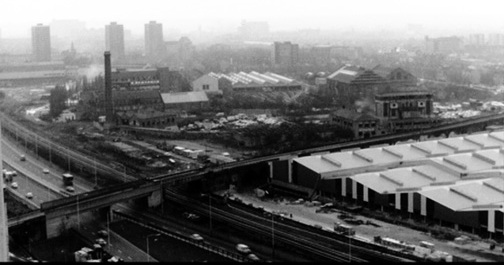Chris Petit's seminal philosophical road movie

Radio On is a subtle, masterfully understated meditation on late 1970s Britain. It's a journey through underground arthouse cinema from the 40s to the 70s, and an experiment in European forms of cinematic expression. But Radio On is also a journey in itself: a kind of existential road movie. It traces the strangely melancholy story of a protagonist disconnected from his job, his friends, his family and his surrounding environment. Upon hearing of the death of his brother - which may or may not have been a suicide - the leading character decides to make a necessary trip from London to Bristol, perhaps to uncover an unknown truth.
Along the way, the protagonist meets a diverse collection of characters. There is a soldier driven to violence and psychosis by a job he despises. A guitar player (played by Sting) who finds himself nostalgic for an idyllic past, dreaming of a future career in music that's been "lost in the post". There is a German woman disconnected from her homeland, her family, her language and her own sense of identity. And then, of course, there is Robert B., the leading character: an individual of no apparent origin and no apparent destination.

Radio On's loose, barely-existent narrative is told through a rich monochrome print of ghostly whites and glossy blacks, presenting fractured, dehumanising Ballardian urban backdrops alongside gloomy, ethereal rural landscapes. There are resonant panning shots of cityscapes saturated with the detritus of defunct nineteenth century industry alongside boarded-up, dilapidated buildings, abandoned petrol stations and empty hotels. All contribute to a profound and poignant sense of wonder and dread. Beautifully crafted static shots seem to emphasise the empty meaning of modern existence through images of blank, static television screens, monotonous flickering marquees and lurching fuel-pump dials.
The soundtrack that underscores the entire film lends context to the time it was made, but also adds a dreamy, abstracted depth to the cinematography. David Bowie's 'Heroes/Helden' opens the film as a camera slowly pans around an austere apartment; the familiar English lyrics juxtapose with a German rendering of the song that throws all listeners into strange new territory.
The familiar quickly becomes unfamiliar, the natural unnatural, the real strangely unreal. Kraftwerk's contributions offer some strange contradictions: an odd, compelling mixture of the human and the inhuman: nostalgic yet distant: human ghosts lost in the machines. Robert Fripp's otherworldly 'Urban Landscape' plays over shots of a city at night, of sound and light... again, familiar yet somehow intangible. There is a distinct, pensive tone to this waking daydream of a film.

Radio On is ultimately a film about a time and a place. There is a sharp, distinct, yet inexplainable mood that saturates every note of every song, and every grain of every shot. The tone of Radio On expresses a time and a place where everything rests on the cusp of inevitable change. The central irony of the film being the final victory of a universal cynicism, as Britain spirals into political turmoil and the unforgiving, authoritarian political agendas of Thatcherism take grip.
There is no final sense of resolution as the film draws to a close. Radio On is an experience to be absorbed rather than a story to be followed; the circumstances that surround Robert's brother are never really made clear. Instead, Radio On dwells on its own thoughtful ambiguities, opening the possibilities not only for the self-discovery of its protagonist, but for the self-discovery of its audience.
Radio On is not a film that espouses truth, or that claims to grant a closure or sense of direction to the lives of its audience. Instead, it is a film situated upon such problems, and choosing to tackle them head-on. Radio On attempts to confront the absurdity and disenchantment of 20th Century living. It is a reflection on existence: a meditation on a time and a place that reflects the circumstances that created it, and that still holds a strong relevance for audiences today. A beautiful, gloomy, melancholy masterpiece, and an absolute must-see.
Watch Radio On free at A Piece of Monologue
Watch Radio On free at A Piece of Monologue


